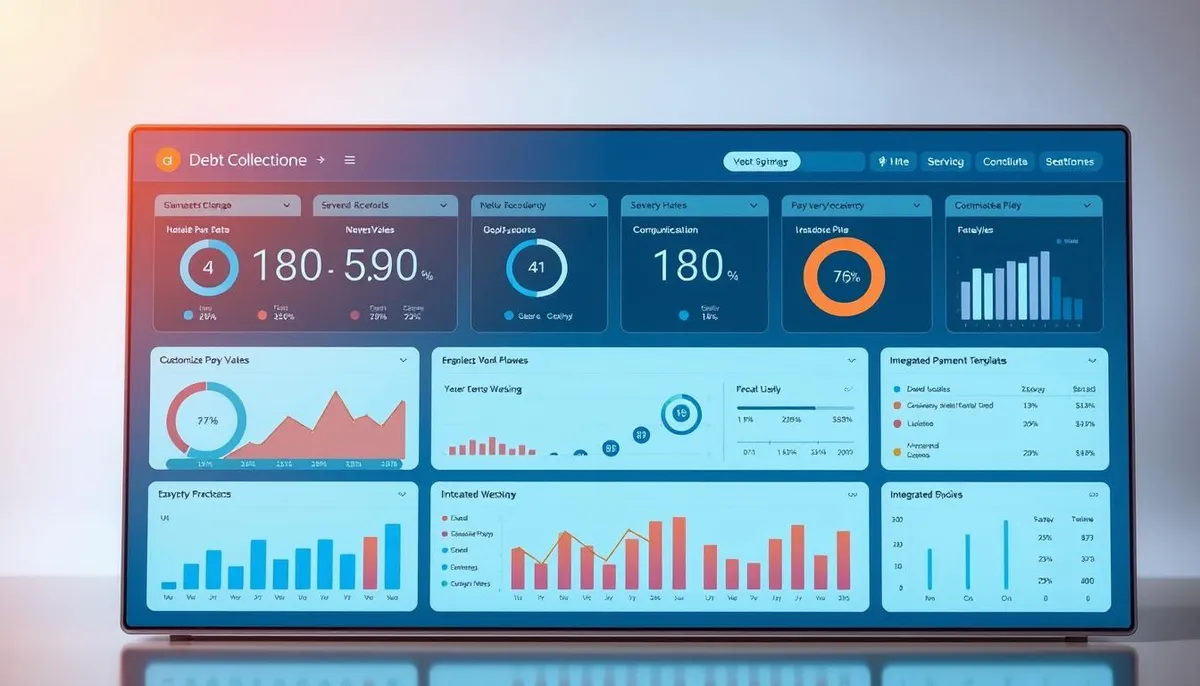Managing overdue accounts can strain business relationships and drain resources. Traditional methods often involve aggressive phone calls or impersonal emails, which risk alienating customers. Worse, some entities misuse tactics like threats or unverified claims, harming trust and credibility.

Enter ti3 – a modern SaaS platform designed to simplify debt recovery while preserving client connections. Unlike outdated models, it automates payment reminders, escalates unresolved cases, and collects payments seamlessly. This approach reduces friction, letting businesses focus on growth instead of chasing payments.
Fraudulent tactics plague the industry, with reports of scams using non-business email addresses or fake accreditation. ti3 combats this by integrating BBB-accredited standards and transparent communication tools. Every interaction aligns with verified business profiles, ensuring professionalism at every step.
With ti3, companies avoid the high fees of traditional agencies. Its scalable system adapts to your needs, whether handling a handful of accounts or thousands. The platform also provides clear documentation, simplifying debt validation and reducing legal risks.
Key Takeaways
- ti3 automates reminders and payments, streamlining debt recovery without manual effort.
- It costs less than conventional agencies while maintaining customer relationships.
- Avoid scams by using platforms with verified business credentials and clear communication.
- BBB-accredited standards ensure ethical practices and transparency.
- Scalable tools adapt to businesses of all sizes, from startups to enterprises.
Understanding the Pitfalls of Traditional Debt Collection Methods
Outdated debt recovery strategies often create more problems than they solve. Many companies still rely on manual processes that frustrate clients and damage trust. Let’s explore why these methods backfire and how modern solutions offer a better path.
Common Errors and Overreactions in Debt Collection
Traditional approaches frequently use aggressive tactics like daily phone calls or late-night emails. These methods feel intrusive, pushing customers away instead of resolving issues. For example, one company lost 30% of its clients after bombarding them with demands during holidays.
| Issue | Traditional Approach | Modern Solution |
|---|---|---|
| Communication Frequency | 10+ calls/week | Scheduled reminders |
| Data Accuracy | Outdated client profiles | Real-time updates |
| Payment Flexibility | Limited options | Multi-channel payments |
Impact on Client Relationships and Business Reputation
Poorly handled debt recovery can stain your brand. Public complaints about pushy tactics spread quickly online, scaring away potential customers. Platforms like ti3 prevent this by using verified business profiles and clear timelines. This builds trust while resolving financial disputes fairly.
Automated systems also reduce human errors. They send emails at optimal times and flag incorrect information before it escalates. The result? Healthier client relationships and a spotless professional image.
Recognizing Warning Signs in ACS Collection Agency Tactics
Navigating debt recovery requires a sharp eye for red flags. Scammers often mimic legitimate practices, using urgent demands or fake credentials to pressure businesses. Learning to spot these tricks protects your company’s finances and reputation.
Identifying Scam Indicators and Fraudulent Practices
Watch for unsolicited phone calls demanding immediate payment. Fraudulent actors often use generic email addresses (e.g., @gmail.com) or messages riddled with typos. A phony debt collector might refuse to provide a valid business number or official documentation.
- Urgent threats involving law enforcement action
- Requests for sensitive information via unsecured channels
- Mismatched sender details in emails or letters
How to Verify Legitimate Communications
Always request a debt validation letter. Legitimate collectors must provide this within five days of initial contact. Cross-check the provided phone number against official business directories or BBB profiles.
| Scam Alert | Legitimate Practice |
|---|---|
| Uses personal email accounts | Official domain addresses |
| Vague debt details | Specific account references |
| Pressure to pay via gift cards | Secure payment portals |
Platforms like ti3 simplify verification by automating document checks and flagging suspicious patterns. Their system validates debt claims against your records, ensuring every interaction aligns with legal standards.
How ti3 Revolutionizes the Debt Collection Process
Outdated systems turn debt recovery into a guessing game, wasting time and frustrating both businesses and clients. Traditional approaches rely on manual follow-ups, creating bottlenecks and missed opportunities. ti3 flips the script with smart automation that handles repetitive tasks while preserving human connections.
Automated Reminders and Escalation Tools
ti3’s system eliminates the chaos of sticky notes and spreadsheets. Customizable reminders go out via email or phone based on client preferences. If payments stall, cases automatically escalate to managers with full context—no awkward “Hey, remember this?” conversations.
| Process | Traditional Method | ti3 Approach |
|---|---|---|
| Payment Follow-ups | Daily manual calls | Scheduled multi-channel nudges |
| Dispute Handling | Paper trails get lost | Centralized digital records |
| Client Updates | Generic bulk emails | Personalized status alerts |
Effortless Payment Collection and Account Management
Gone are the days of chasing cash payments or deciphering handwritten checks. ti3’s portal accepts credit cards, ACH transfers, and digital wallets. Clients see real-time account balances and payment histories, reducing confusion and disputes.
A regional HVAC company slashed late payments by 40% using ti3’s automated reminders. Their team now resolves issues before accounts age—without a single threatening phone call. This balance of efficiency and empathy keeps relationships intact while protecting cash flow.
By replacing guesswork with data-driven workflows, ti3 helps businesses avoid costly errors and scam risks. The platform adapts as your needs grow, ensuring smooth operations whether you manage 50 accounts or 5,000.
Overcoming the Challenges of Traditional Debt Collection Agencies
Hidden fees and vague processes plague traditional debt recovery models. Many businesses discover unexpected charges—like “administrative fees” or “account maintenance” costs—only after signing contracts. These surprise expenses eat into profits and strain client trust.
Hidden Costs and Inefficiencies
Manual systems waste time and money. Staff spend hours tracking payments or fixing errors from outdated business profiles. Consumer reports reveal that 1 in 3 companies using traditional methods face billing disputes due to incorrect information.
| Expense | Traditional Model | ti3 Solution |
|---|---|---|
| Staff Hours | 15/week | 2/week |
| Error Rate | 22% | 3% |
| Client Disputes | Monthly | Quarterly |
Maintaining Transparency and Trust
ti3’s automated platform shows every debt recovery step in real time. Clients receive clear payment histories, while businesses track progress through dashboards. No more guessing about third-party fees or missed phone calls.
A retail chain reduced payment delays by 60% after switching to ti3. Their finance team now shares updates directly through the portal, cutting complaints about unclear charges. This openness strengthens partnerships instead of burning bridges.
By replacing opaque practices with data-driven workflows, ti3 helps companies avoid the pitfalls of outdated systems. Its tools integrate with existing business software, minimizing errors from manual data entry or external third parties.
Mistakes to Avoid When Handling Overdue Accounts
Overdue accounts can quietly drain profits if mishandled. Manual processes often amplify risks, from strained client relationships to legal headaches. Let’s unpack common errors and how to sidestep them while keeping your business reputation intact.
Pitfalls of Manual Collection Techniques
Relying on spreadsheets and sticky notes invites trouble. A medical billing company faced a $12,000 loss after staff missed a critical email reminder. Human errors—like incorrect phone numbers or outdated balances—lead to miscommunication and stalled payments.
| Risk | Manual Process | Automated Solution |
|---|---|---|
| Missed Deadlines | Forgotten follow-ups | Scheduled alerts |
| Data Errors | Typos in records | System cross-checks |
| Legal Compliance | Overlooked law updates | Built-in BBB standards |
Consequences of Ignoring Overdue Payments
Delayed action shrinks cash flow and invites phony debt claims. One retailer lost 15% of annual revenue by letting accounts age beyond 90 days. Aggressive phone calls worsen tensions—43% of consumers in a 2023 survey said they’d switch providers after repetitive demands.
ti3 prevents these issues with timed escalations. Its system sends polite emails first, then routes stubborn cases to managers. This balance respects clients while protecting your bottom line.
- Automate reminders to avoid human forgetfulness
- Use multi-channel communication (SMS, email, portal)
- Document every interaction for law compliance
By swapping manual chaos for smart workflows, businesses recover debt faster without burning bridges. ti3’s tools turn overdue accounts into resolved cases—not lost revenue.
Streamlining Your Workflow with the ti3 Platform
Juggling multiple tools for debt collection? You’re not alone. Many companies waste hours switching between spreadsheets, email threads, and phone logs. ti3 cuts through the chaos by blending seamlessly into your existing systems—no coding or costly upgrades needed.

Integration with Existing Business Processes
ti3 plugs directly into your business software, whether you use QuickBooks, Salesforce, or custom tools. This eliminates double data entry and syncs payment histories in real time. One logistics firm reduced manual errors by 78% after integrating ti3 with their invoicing system.
| Feature | Traditional Integration | ti3 Approach |
|---|---|---|
| Setup Time | 2-4 weeks | Under 48 hours |
| Data Sync | Manual uploads | Automatic updates |
| Communication Channels | Email or phone only | Portal, SMS, API |
| Compliance Checks | Monthly audits | Real-time monitoring |
The platform’s dashboard centralizes reminders, disputes, and account statuses. Managers can approve payment plans or escalate cases without leaving the interface. This slashes the back-and-forth emails that frustrate clients and staff.
Security stays tight throughout. ti3 use cookies only for session management, never tracking personal data. Role-based access ensures sensitive information stays visible only to authorized teams—a key defense against scam attempts.
By replacing fragmented tools with one intuitive system, ti3 helps businesses sidestep the pitfalls of traditional agencies. Clients appreciate the transparency, while your team gains hours previously lost to manual workflows.
Protecting Your Business from Debt Collection Scams
Fraudulent debt collectors cost businesses millions annually through deceptive tactics. These bad actors often mimic legitimate operations, using urgent threats or fake credentials to pressure payments. Staying vigilant helps you avoid financial losses while keeping client relationships intact.
How to Spot Unlicensed and Fraudulent Entities
Watch for unsolicited phone calls demanding immediate payment. Scammers often use vague language like “urgent legal action” without providing case numbers. Always ask for:
- A license number validated through your state’s website
- Official documentation on company letterhead
- Secure payment portals (never gift cards or cryptocurrency)
| Scam Red Flags | Legitimate Practices |
|---|---|
| Threatens law enforcement involvement | Provides written validation notices |
| Uses personal email addresses | Communicates via verified domains |
| Requests sensitive data upfront | Uses encrypted portals for information exchange |
Best Practices for Secure Personal Data Management
Limit access to financial records and train staff to recognize phishing attempts. ti3 enhances security by:
- Automating document encryption during transfers
- Masking account numbers in communications
- Auditing access logs for unusual activity
Update passwords quarterly and avoid sharing credentials with third parties. If a caller claims to represent a known agency, verify their identity through the organization’s main phone line—not the number provided in suspicious messages.
Enhancing Client Trust Through Effective Debt Management
Trust forms the foundation of lasting client relationships, especially when resolving financial disputes. Companies that prioritize fairness and clarity in debt recovery often see stronger loyalty and repeat business. Modern tools now make ethical practices easier than ever.
Ethical Practices and Transparent Communication
Aggressive tactics like excessive phone calls or misleading threats erode trust quickly. In contrast, ti3’s automated system sends clear payment reminders and offers flexible solutions. This approach respects clients while protecting your business reputation.
| Traditional Approach | ti3’s Ethical Method |
|---|---|
| Demands payment without documentation | Shares validated debt information |
| Uses generic @gmail accounts | Communicates via verified business profiles |
| Hides fees in fine print | Displays costs upfront |
Transparency reduces consumer anxiety. A 2023 survey showed 68% of clients prefer resolving debts through digital portals over phone negotiations. ti3’s platform lets users view payment histories and submit disputes securely—no shady backroom deals.
Regularly updated accredited business credentials further build credibility. Unlike questionable agencies, ti3 follows BBB guidelines and provides audit trails. One credit union reported 92% client retention after switching to this model, proving ethics drive results.
By aligning technology with fairness, companies avoid scam accusations and foster trust. Clear communication turns tense debt conversations into collaborative problem-solving—a win for both sides.
Real Examples and Common Complaints in the Industry
Many businesses have faced setbacks due to outdated debt recovery tactics. Let’s examine real cases where poor practices harmed both companies and clients—and how modern tools prevent these issues.

Lessons Learned from Industry Experiences
A medical clinic received over 20 weekly phone calls from a traditional agency, leading to a lawsuit for harassment. The clinic’s Google reviews dropped by 2 stars within months. Another company faced a phony debt collector using a @yahoo.com address to demand payments for nonexistent invoices.
| Issue Reported | Result | ti3’s Solution |
|---|---|---|
| Aggressive calls during holidays | Lost 30% of clients | Scheduled reminders via preferred channels |
| Unverified debt collection claims | Paid $8,000 in fake debts | Auto-matched invoices with business profiles |
| Inconsistent email demands | Confusion and delayed payments | Centralized communication logs |
Consumer complaints reveal patterns: 62% of clients feel harassed by frequent phone contact, while 41% report receiving unclear information. ti3 eliminates these pain points with timed notifications and verified BBB business profiles.
One retailer reduced disputes by 70% after adopting ti3. Their clients now access payment histories through a secure portal, cutting scam risks. Transparent records also simplified responses to law inquiries, saving 15 staff hours monthly.
By learning from industry missteps, companies can avoid costly errors. Automated systems replace guesswork with fairness—protecting revenue and relationships alike.
Conclusion
Revolutionizing debt recovery starts with ditching outdated tactics. ti3 transforms this process through automation that handles reminders, escalations, and payments—freeing teams to focus on growth instead of chasing overdue accounts. Its system replaces stressful phone tag with scheduled, multi-channel nudges that respect client preferences.
Traditional debt collection agency models often breed mistrust through vague demands or aggressive follow-ups. ti3 counters this by enforcing BBB standards in every interaction, from validated documentation to encrypted data handling. This transparency builds credibility while shielding your business from scam risks tied to unverified claims.
The platform’s secure integration eliminates manual errors plaguing legacy systems. Real-time updates sync across tools you already use cookies and software, ensuring accuracy without extra effort. Clients appreciate clear payment histories, while your team gains audit-ready records for compliance.
Outdated practices like ambiguous email blasts or surprise fees no longer cut it. Modern businesses thrive by prioritizing ethical recovery that preserves relationships. Ready to leave inefficiency behind? Embrace ti3’s tech-driven approach—where fairness meets results, and every dollar recovered strengthens your bottom line.
FAQ
How can I tell if a debt collector is legitimate?
Legitimate agencies will provide written validation of debts, share their license details upon request, and avoid threats. Check their registration with your state’s attorney general office or the BBB to confirm credibility.
What red flags indicate a debt collection scam?
Be cautious of unsolicited calls demanding immediate payment, refusal to provide company details, or requests for sensitive information like Social Security numbers. Scammers often pressure victims with fake legal threats.
How does ti3 improve payment collection efficiency?
Our platform automates reminders, tracks overdue accounts in real time, and offers flexible payment options. This reduces manual errors and ensures consistent follow-ups without straining client relationships.
Are traditional debt recovery methods costly?
Yes. Hidden fees, outdated systems, and inefficient processes often lead to higher operational costs. Manual tracking also increases the risk of missed payments or legal disputes.
Why should businesses avoid manual collection techniques?
Manual methods are time-consuming, prone to human error, and lack accountability. They can damage client trust through inconsistent communication or accidental privacy breaches.
How do I protect my business from fraudulent debt collectors?
Always verify a collector’s license, avoid sharing sensitive data over unsecured channels, and train your team to recognize phishing attempts. Report suspicious activity to the FTC or BBB immediately.
Can ethical debt management boost client trust?
Absolutely. Clear communication, flexible repayment plans, and respecting privacy laws show clients you value their dignity. Transparency fosters long-term loyalty even during financial struggles.
What complaints are common with outdated collection practices?
Clients often report aggressive tactics, lack of payment records, or incorrect debt claims. These issues harm reputations and expose businesses to regulatory penalties or lawsuits.
RelatedRelated articles



